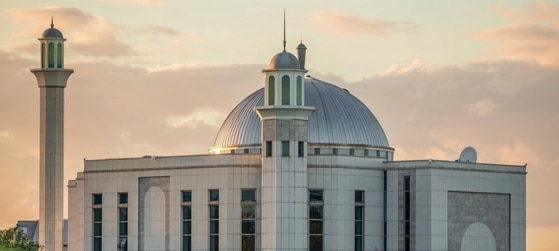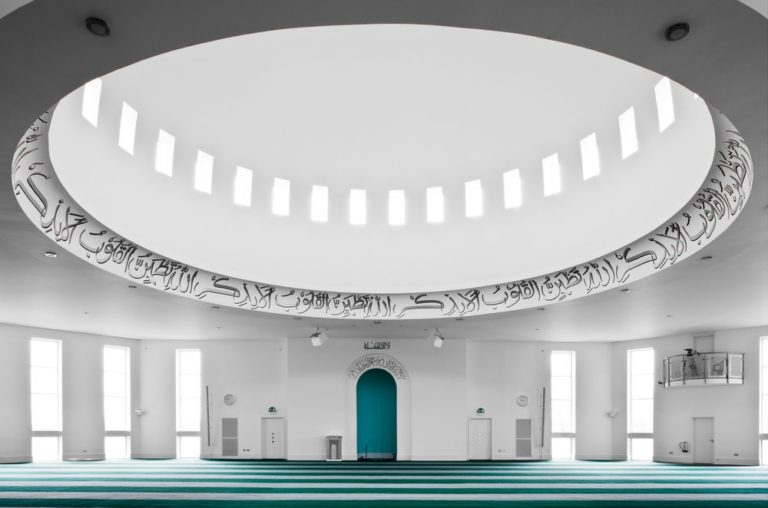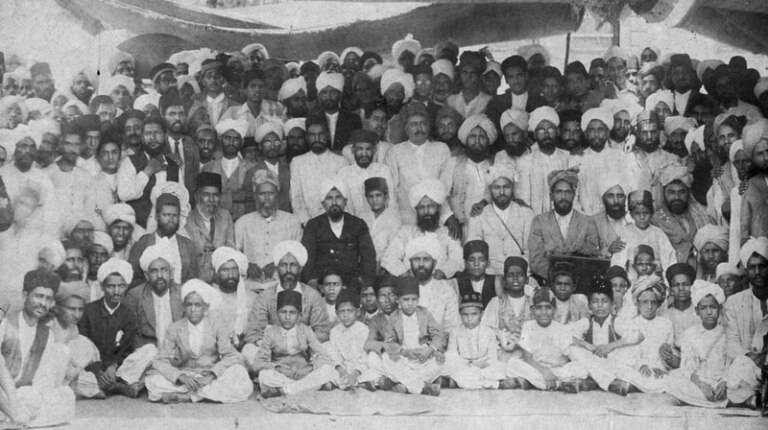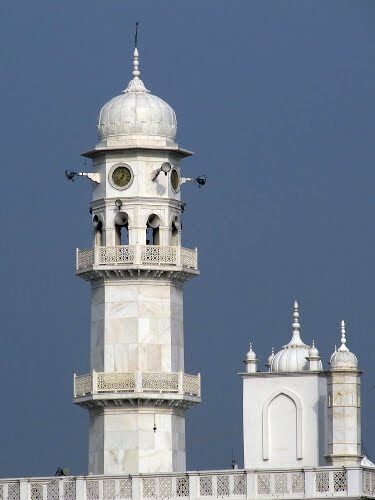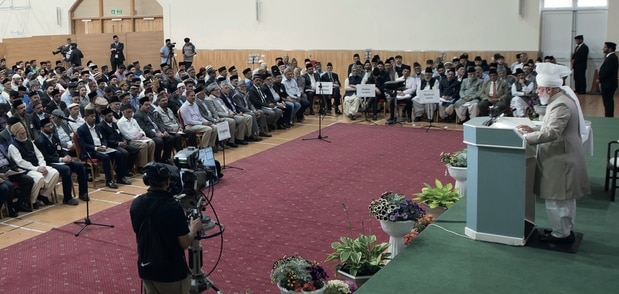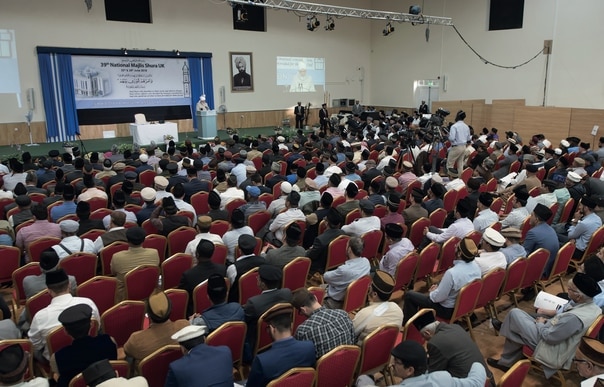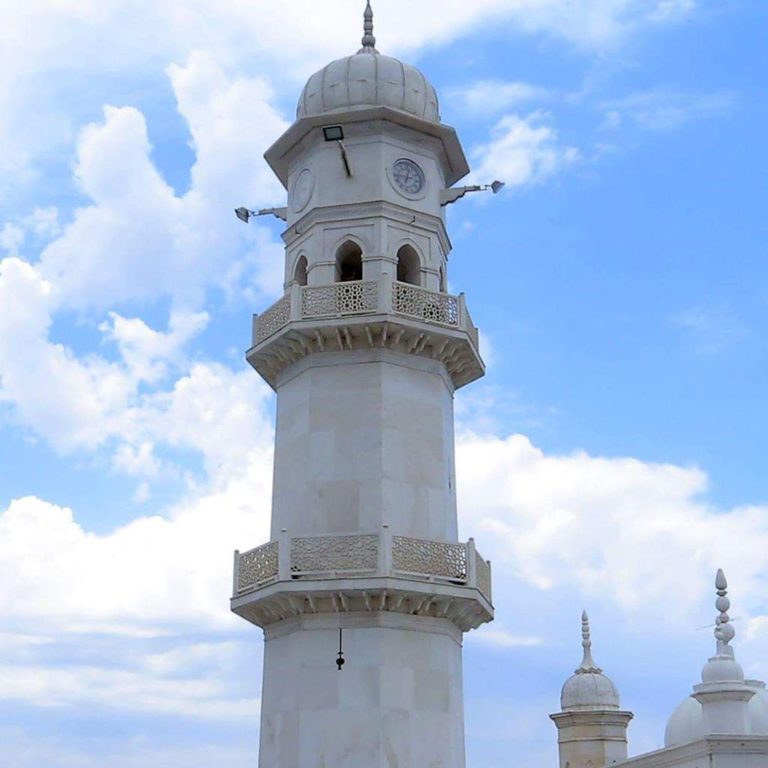Friday Sermon
1 June 2018
Men of Excellence
After reciting the Tashahud, Ta‘awuz, and Surah Al-Fatihah, Hazrat Khalifatul Masih Vaa stated:
Hazrat Okasha bin Mihsanra was a Companion of the Holy Prophetsa. Hazrat Okasha bin Mihsanra is counted among the foremost Companions. On the occasion of the Battle of Badr, he joined as a cavalier and also broke his sword. Upon this, the Messengersa of Allah handed him a piece of wood, which, in his hand, became as if it was a very sharp sword, made of high-quality iron. Thus, he fought with that until God Almighty granted victory. Later, he joined the Holy Prophetsa in all the other battles using the same sword. That wooden sword remained with him till he passed away. The sword was called ‘Aun.
The Holy Prophetsa gave him the glad tiding, “You will enter Paradise without any reckoning.” (Usdul Ghaaba, Vol. 4, pp. 64-65, Okasha bin Mihsan, Darul Kutb-ul-Ilmiyah, 1996, Beirut).
On the occasion of the Battle of Badr, the Holy Prophetsa said to the Companions that the best cavalier of Arabia had joined them. The Companions asked, “O Messenger of Allahsa, who is that individual?” He replied, “Okasha bin Mihsanra”. (Sirat Ibn-e-Hisham, p. 435, Darul Kutb-ul-Ilmiyah, 2001, Beirut)
It is narrated by Hazrat Abu Hurairahra, “I heard Allah’s Messengersa saying, ‘From among my followers, a party of seventy thousand will enter Paradise, whose faces will glisten like the full moon.’” Hazrat Abu Hurairahra further narrates, “On hearing that, Okasha bin Mihsanra stood up, and holding his outer garment said, ‘O Allah’s Messengersa! Pray that may Allah make me one of them.’ The Holy Prophetsa prayed, ‘O Allah! Make him from among them.’ Another man from the Ansar[Muslims native to Medina]stood up and said, ‘O Messenger of Allahsa! Pray so that Allah makes me one of them also. ‘The Holy Prophetsa replied,
سَبَقَكَ بِهَا عُكَاشَه
[Meaning] ‘Okasha has succeeded ahead of you in this regard.’” (Sahih Muslim, Kitab-ul-Iman, Hadith no. 369)
While narrating this account in his book about the life and character of the Holy Prophetsa, Hazrat Mirza Bashir Ahmad Sahibra writes, “During one sitting, the Holy Prophetsa said, ‘From my ummah[followers], seventy thousand people will enter Paradise without any reckoning’, meaning that they will have such a high spiritual rank and the grace and mercy of God will be such that there will be no need for their reckoning. The Holy Prophetsa also said that their faces would be glowing on the Day of Resurrection, just as the full moon glistens on the horizon. Upon this, Hazrat Okashara then said, ‘Pray for me as well.’ The Holy Prophetsa prayed that he may also be among those people.” After this, Hazrat Mirza Bashir Ahmad Sahibra has written a very beautiful commentary on this and also given his perspective.
He writes, “This may appear to be a very minor incident from the life of the Holy Prophetsa. However, it contains a treasure of spiritual insights. Firstly, we learn from it that God Almighty has blessed the ummah with the spiritual blessings of the Holy Prophetsa, which have reached such perfection, that on the Day of Resurrection there will be seventy thousand such people from his ummah, who due to their extraordinary spiritual status and the special grace and mercy of God, will be exempt from the trial of any reckoning. (Seventy thousand could also denote a large number of people.)
“Secondly, from this we learn that the Holy Prophetsa was granted such nearness to God Almighty that upon his supplications, God Almighty immediately revealed to him or showed him a vision informing him that Okasha is among the seventy thousand. It is also possible that Okashara was previously not included in this group and that God granted him this honour as a result of the prayers of the Holy Prophetsa.
“Thirdly, from this account we also learn of the immense respect the Holy Prophetsa had for God Almighty. Moreover, the Holy Prophetsa desired to invigorate the sense of striving [for the cause of God] among his Ummah to such an extent that when another person, following Okashara, requested him with a similar prayers, the Holy Prophetsa refused to pray individually due to the lofty spiritual status this pure group was blessed with. Rather, he turned the attention of Muslims towards righteousness, faith and virtuous deeds, and informed them that if they established this and turned their attention towards this, they would attain this status.
“Fourthly, this also sheds light on the high morals of the Holy Prophetsa in an extraordinary manner. The reason for this is that the Holy Prophetsa did not decline in a manner which would upset and hurt the feelings of the Ansari making this request. Rather, he declined in a most excellent manner.” (Sirat Khatam-un-Nabiyyeen, Hazrat Mirza Bashir Ahmad Sahib M.A., pp. 667-668).
“The Holy Prophetsa sent Hazrat Okashara to battles in various expeditions and appointed him as their leader. In Rabi’-ul-Awwal [month of the Islamic calendar] in the sixth year of Hijra [migration to Medina], the Holy Prophetsa appointed Hazrat Okashara as the leader of forty Muslims and sent them to face the tribe of Bani Asad. This tribe had set up their camp near a fountain called Ghamar and was located at a distance of a few days from Medina. Okasha’s group travelled very quickly and reached close [to the tribe] so that they may prevent them from causing any mischief. Following this, they came to know that the people of the tribe had dispersed as they had learnt of the Muslims drawing close. Upon this, Okashara and his group returned to Medina without fighting.” (Sirat Khatam-un-Nabiyyeen, Hazrat Mirza Bashir Ahmad Sahib M.A., p. 666).
In other words, they did not try to fight with them without any reason. Thus, is completely contrary to the allegation raised that Muslims were keen on waging wars.
Hazrat Ibn ‘Abbas narrates that when Surah Al-Nasr was revealed to the Holy Prophetsa, he instructed Hazrat Bilalra to call the Adhan [Muslim call for prayer]. Following the prayer, the Holy Prophetsa delivered a sermon and people began to weep profusely as they heard it. The Holy Prophetsa inquired, “O people! How am I as a prophet?” In response, the people replied “May God reward you. You are the best of all prophets. You are like a gracious father and a kind guiding brother to us. You have conveyed to us the messages and revelation of God Almighty and you have called us towards the path of our Lord with wisdom and goodly exhortation. Hence, may God reward you with the best reward, which He blesses His prophets.” The Holy Prophetsa then said, “O ye Muslims! I swear by God and by the responsibility placed upon me that if I have committed any cruelty or injustice towards anyone, he should stand up and avenge himself.” However, no one stood up. The Holy Prophetsa took another oath and repeated this. However, no one stood up. The Holy Prophetsa repeated this a third time saying, “O ye Muslims! I swear by God and by the responsibility placed upon me that if I have committed any cruelty or injustice towards anyone, he should stand up and avenge himself prior to the Day of Judgement.” Upon this, an elderly person stood up from among the people, whose name was Okashara. He passed through the [crowd of] Muslims until he stood before the Holy Prophetsa and said, “O Prophet of Godsa, may my parents be sacrificed for your sake. If you had not repeatedly taken an oath, I would certainly not have stood up.” Hazrat Okashara then said, “I was with you during a battle. On the way back, my camel came close to your camel. I dismounted from my camel and approached you in order to kiss your feet. However, you struck your stick, which hit me on the side. I was not sure whether you struck me with the stick or the camel.” The Holy Prophetsa said, “By the glory of Allah! The Messenger of God cannot hit you intentionally.” The Holy Prophetsa then addressed Hazrat Bilalra and said, “O Bilal! Go to the house of Fatima and bring that stick.” Hazrat Bilalra went and said to Hazrat Fatimara, “O daughter of the Holy Prophetsa! Give me the (such and such) stick.” Hazrat Fatimara replied by saying: “O Bilal! What is my father going to do with this stick? Is this not the day of Hajj [Islamic pilgrimage] and not of war? Upon this, Hazrat Bilalra said, “O Fatima! How unaware are you in relation to your father, the Messenger of Godsa? The Holy Prophetsa is saying farewell to the people, leaving this world and allowing people to avenge themselves.” Hearing this, Hazrat Fatimara was astonished and asked, “O Bilal! Who will desire to seek revenge from the Holy Prophetsa?” She further said “O Bilal! Tell Hassan and Hussain to stand before that person so that he may avenge himself on them instead and thus preventing that man from seeking revenge from the Holy Prophetsa.”
Hence, Hazrat Bilalra returned to the mosque and handed the stick to the Holy Prophetsa, who then handed it to Okashara. When Hazrat Abu Bakrra and Hazrat Umarra observed this scene, both of them stood up and said, “O Okasha! We are standing before you. Avenge yourself on us and do not do anything to the Holy Prophetsa. The Holy Prophetsa said to both of them that “O Abu Bakr and Umar! Stop! God Almighty is aware of your status.” Then Hazrat Alira stood up and said “O Okasha! I have spent my entire life with the Holy Prophetsa and I cannot bear that you hit the Holy Prophetsa. Hence, I present my body, avenge yourself on me. You may hit me a hundred times but do not seek revenge from the Holy Prophetsa.” The Holy Prophetsa said, “O Ali! Remain seated. God is aware of your intention and status.” After this, Hazrat Hassanra and Hussainra both stood up and said, “O Okasha! We are the grandchildren of the Holy Prophetsa and seeking revenge from us is akin to seeking revenge from the Holy Prophetsa.” The Holy Prophetsa said to both of them, “O my dear ones, sit down!” The Holy Prophetsa then turned to Okashara and said, “O Okasha, strike me!” Hazrat Okashara said, “O Prophetsa of God! My stomach was bare without any cloth at the time you hit me.” Upon this, the Holy Prophetsa lifted the covering from his stomach. Witnessing this scene unfold, the Muslims started to weep profusely and asked, “Is Okasha really going to hit the Holy Prophetsa?”
However, when Hazrat Okashara saw the glow on the body of the Holy Prophetsa, he raced towards the Holy Prophetsa and started to kiss his body and said, “O Messenger of Godsa! Who can ever imagine taking revenge from you?” Upon this, the Holy Prophetsa said, “Are you going to take revenge or are you going to forgive?” Hazrat Okashara responded, “O Messengersa of God! I forgive you with the hope that God will pardon me on the Day of Judgment.” The Holy Prophetsa addressed everyone and said, “Whoever desires to see my companion in paradise should look at this old gentleman.” Hence all the Muslims stood up and began kissing the forehead of Hazrat Okashara and congratulated him for he had attained a high status and a close companionship of the Holy Prophetsa. (Majma-ul-Zawid, Vol. 8, pp.429-431, Kitab Ilaamat-ul-Nabuwa, Hadith no. 14253, Darul Kutb-ul-Ilmiyah, 2001, Beirut)
This was Hazrat Okashara, who realised that the opportunity to kiss the body of the Holy Prophetsa during his lifetime may not come again as he was informing everyone about his departure from this world.
During the Khilafat of Hazrat Abu Bakrra, Hazrat Okashara was sent with Hazrat Khalid bin Waleedra to crush a rebellion of a certain tribe that had left Islam. Isa bin Umailah relates a narration from his father in which he says, “When Hazrat Khalid bin Waleedra would approach the enemy, if he heard the Adhan being called, he would not attack but if he did not hear the Adhan, then he would launch an attack. When they reached a tribe situated at a place called Buzaakha, Hazrat Khalid bin Waleedra sent Hazrat Okashara bin Mihsan and Hazrat Thabitra bin Akram to obtain information about the enemy.
Both of them were on horseback and the name of Hazrat Okasha’s horse was Al-Razaam and that of Hazrat Thabit’s was Al-Muhabbar. They came across Tulayhah and his brother Salmah who had travelled ahead of the enemy in order to gather information about the Muslim army. Tulayhah confronted Hazrat Okashara, while Salmah confronted Hazrat Thabitra and the brothers martyred these two companions.”
Abu Waqid Laysi narrates, “Two hundred of us were leading the Muslim enemy. Upon finding the bodies of Hazrat Okashara and Hazrat Thabitra, we stood by until Hazrat Khalidra came and ordered us to bury these two companions in the same blood-stained clothes they were martyred in. This incident took place on 12 Hijri.” Thus, this is the account of their martyrdom. (At-Tabaqat Al-Kubra, Vol. 3, p.245, Saabit bin Akram, Dar Ihya At-turath Al-Arabi, 1996, Beirut).
Hazrat Kharijah bin Zaidra was one of the Companions of the Holy Prophetsa who belonged to Aghar family from among the Khazraj tribe. His daughter, Hazrat Habibah bint Kharojahra was married to Hazrat Abu Bakrra and was the mother of Hazrat Umme Kulthumra. The Holy Prophetsa established brotherhood between Hazrat Kharijahra bin Zaid and Hazrat Abu Bakrra. He was a chief from among his tribe and was considered amongst the noble companions. He had taken the oath of allegiance in Aqabah. (At-Tabaqat Al-Kubra, Vol. 3, p.271, Dar Ihya At-turath Al-Arabi, 1996, Beirut).
After migrating to Medina, Hazrat Abu Bakrra had stayed at his house. (Usdul Ghaaba, Vol. 1, p.640, Kharija bin Zaid, Darul Fikr, 2003, Beirut).
He took part in the Battle of Badr and during the battle of Uhud he attained the status of martyrdom whilst fighting with immense bravery and valour. He was attacked by spears and sustained more than thirteen wounds. Safwan bin Umayyah walked passed him as he lay on the floor due to the wounds. Safwan recognised him and attacked, which resulted in his martyrdom. He also mutilated his body and said, “He was amongst those who killed Abu Ali i.e. my father Umayyah bin Khalf. I have the opportunity now to kill the noble Companions of the Holy Prophet and grant satisfaction to my heart.” He killed Hazrat ibn Kaukalra, Hazrat Kharijahra bin Zaid and Hazrat Ausra bin Arqam.
Hazrat Kharijahra and Hazrat Sa‘d bin Rabi’ra – who was the cousin of the Holy Prophetsa – were buried in the same grave. (Al-Isti‘ab, Vol. 3, p.324, Darul Kutub-ul-Ilmiya, 2002, Beirut).
It is narrated that on the day of the Battle of Uhud, Hazrat Abbasra bin Abadah called upon the Muslims in a loud voice and said, “O Muslims! Remain attached with God and His Prophetsa. The calamity you have experienced just now was because of being disobedient to the Prophetsa. He promised you support but you did not show patience.”
Then Hazrat Abbasra took off his helmet and armour and asked Hazrat Kharijahra, “Do you need this?” Hazrat Kharijahra responded, “No. I also long for what you desire.” Thereafter, they were surrounded by the enemy. Abbas bin Abadah stated, “If the Holy Prophetsa is injured in front of our eyes, what excuse will we have in front of our God?” Hazrat Kharijahra stated, “We will have no excuse and neither any argument to present before our Lord.” Sufyan bin ‘Abdus Shams Salmi martyred Hazrat ‘Abbasra bin Abadah and Hazrat Kharijahra bin Zaid sustained more than ten wounds caused by arrows. (Kitab-ul-Maghazi, Vol.1, pp.227-228, Baab Ghazwa Uhad, Daar-ul-Kutub-ul-Illmiyah, 2004, Beirut)
Hazrat Malikra bin Dukhsham walked by Hazrat Kharijahra bin Zaid on the day of Uhud. Hazrat Kharijahra was fatally injured and had received nearly thirteen wounds. Hazrat Malikra said to him, “Are you aware that the Holy Prophetsa has been martyred?” Hazrat Kharijahra responded, “If the Holy Prophetsa has been martyred then certainly God is living and He will not die. Muhammadsa has conveyed the message. You should also fight for the sake of your faith.” (Kitab-ul-Maghazi, Vol.1, p.243, Baab Ghazwa Uhad, Daar-ul-Kutub-ul-Illmiyah, 2004, Beirut)
Hazrat Kharijahra had two children out of which one was Zaid bin Kharijah who passed away during the Khilafat of Hazrat Uthmanra. Hazrat Kharijah’s second child was Hazrat Habibah bint Kharijahra who was married to Hazrat Abu Bakrra. At the time of the demise of Hazrat Abu Bakrra, she was expecting a child. Hazrat Abu Bakrra had mentioned, “I am expecting a daughter from her” and thus she gave birth to a baby girl. (Usdul Ghaaba, Vol. 1, pp.640-641, Kharija bin Zaid, Darul Fikr, 2003, Beirut).
Another Companion of the Holy Prophetsa was Hazrat Ziyadra bin Labeed. His mother’s name was Amrah bint Abeed Matroof. Hazrat Ziyadra had a son called Abdullah. He accepted Islam during second pledge of Aqabah along with 70 Companions. On his return to Medina after accepting Islam, he broke the idols of his tribe Banu Bayada which they used to worship. He then travelled to the Holy Prophetsa in Mecca and remained there until the Holy Prophetsa migrated to Medina. So he too migrated after the Holy Prophetsa had reached. This is why Hazrat Ziyadra is renowned as a Muhajir Ansari. He was a Muhajir [one who migrated from Mecca] and an Ansari[native of medina] too. Hazrat Ziyadra fought alongside the Holy Prophetsa in the Battle of Badr, the Battle of Uhud, the Battle of the Ditch and in all other battles of the Holy Prophetsa. (Usdul Ghaaba, Vol. 3, p. 302, Ziyad bin Labeed, Darul Fikr, 1996, Beirut).
After migrating to Medina, the Holy Prophetsa was passing by the quarters of Banu Bayada, so Hazrat Ziyadra greeted him saying, “Ahlan wa sahlan” and offered his home for him to stay. The Holy Prophetsa said to let his camel loose, it will find its home by itself.
In Muharram of 9th Hijri, the Holy Prophetsa appointed different collectors for Sadaqah and Zakat, and Hazrat Ziyadra was appointed as the collector for the area of Ḥaḍhramaut. He continued his service there till the time of Hazrat Umar’sra Khilafat. After being relieved of his duty, he moved to Kufa and passed away in 41 Hijri. (Sarwar-e-Kainat Ke Pachass Sahaaba, Talib Al-Haashmi, pp.557-559, Metro Printers, 1985, Lahore)
It has been written down in history that when the uprising of apostasy [of certain tribes] had gained momentum during the Khilafat of Hazrat Abu Bakrra and people refused to pay the Zakat, Ash‘ath bin Qais Al-Kindi was also among those to become an apostate. Hazrat Ziyadra was appointed to confront him. When he went to attack him, he had taken refuge in the Naheer fortress. Hazrat Ziyadra had besieged them so severely to the point that he became distressed and sent a message that if he, along with nine other people, is granted safety, they would open the doors to the fortress. Hazrat Ziyadra said to write down the agreement and bring it to him to stamp. Thereafter they opened the doors. Later on, when they checked the agreement, the names of the nine people were written down but Ash‘ath forgot to write down his own name, so he was taken prisoner to Medina with the rest of the captives. (Imta-ul-Asmaa, Vol.14, pp.254-255, Darul Kutubil Ilmiyya, 1996, Beirut)
Another Companion of the Holy Prophetsa was Mu‘attibra bin Ubaid. He had no offspring so his nephew Usair bin ‘Urwah was his sole inheritor. Hazrat Mu›attib bin Ubaid participated in the Battle of Badr and the Battle of Uhud and was martyred on the day of Rajee‘. (At-Tabaqat Al-Kubra, Vol. 3, p.240, Dar Ihya At-turath Al-Arabi, 1996, Beirut)
The incident of Rajee‘ is that in which ten Companions were martyred. Regarding this incident, Hazrat Mirza Bashir Ahmad Sahibra wrote, “Those days were very perilous for the Muslims, and the Holy Prophetsa was receiving highly alarming news from all directions, however the greatest danger posed to the Holy Prophetsa was coming from the Quraish of Mecca who had become bold and daring after the Battle of Uhud. Perceiving this threat, the Holy Prophetsa prepared a party of ten Companions in 4 Hijri during the month of Safar and appointed Ahsan bin Thabit as the leader. The Holy Prophetsa gave them orders that they must quietly reach near Mecca and gather intelligence about what the Quraish were planning and to inform him of their intentions. However, the party had not yet departed when a few people from the tribes of ‘Adal and Qarah approached the Holy Prophetsa stating that there were many people from among their tribes who are inclining towards Islam. Therefore, the Holy Prophetsa should send some people back with them who will preach to them about Islam. When the Holy Prophetsa came to know of their desire, he sent the same party of Companions which were preparing to leave, to gather information about the Quraish. However, as it was later discovered that these people were lying and had come to Medina due to the instigation of Banu Lihyan, who had plotted to take revenge on the killing of their chief, Sufyan bin Khalid, and had thus contrived the plan that when the Muslims come out of Medina on this pretence, they would attack them. In lieu of this service, the Banu Lihyan had promised the tribes of ‘Azal and Qarah many camels. When these treacherous people of ‘Adal and Qarah reached between Asfan and Mecca, they discreetly sent a message to the Banu Lihyan that the Muslims were accompanying them and so they should come forth. Upon this, two hundred young men of Banu Lihyan, among whom were one hundred archers departed in pursuit of the Muslims and subdued them at a place known as Rajee‘. (Rajee‘ is the name of a place.) How could ten men compete against two hundred soldiers. At the same time, the Muslims were taught not to throw in their arms. The Companions immediately ascended to a nearby hillock and prepared for battle. The disbelievers, who did not consider deception as being reprehensible, called out to them and said, ‘Come down from the mountain, we give you a firm promise that we shall not kill you.’ Asimra responded, ‘We have no confidence whatsoever in your treaties and agreements. We cannot descend on your guarantee.’ Then, he raised his head towards the heaven and said, ‘O God! You are witnessing our state. Do convey knowledge of our condition to Your Messenger.’ Hence, Asimra and his Companions stood and fought, and were finally martyred in battle. When seven Companions had been martyred, and only Khubaibra bin ‘Adiyy, Zaidra bin Dathinah, and one other Companion were left, the disbelievers whose actual desire was to capture these people alive, called out again and said, ‘There is still time. Come down and we promise not to cause you any harm.’ This time, these innocent Muslims fell into their trap and descended.”
However, as soon as they stepped down, the disbelievers tied them with the strings of their arrow bows. Upon this, the Companion of Khubaibra and Zaidra, whose name has been recorded in history as being Abdullahra bin Tariq, could not restrain himself and called out, ‘This is your first breach of agreement and who knows what you shall do hereafter,’ and Abdullahra refused to continue along with them. For some distance, the disbelievers dragged Abdullahra along, beating and assaulting him, after which they then killed him and left him there. Moreover, now that their revenge had been sought, in order to please the Quraish, and also out of greed for money, they took Khubaibra and Zaidra and made their way to Mecca; upon reaching there, they sold both of them to the Quraish. As such, Khubaibra was purchased by the sons of Harith bin Amir bin Naufal, because Khubaibra had slain Harith in the battle of Badr and Zaidra was purchased by Safwan bin Umayyah. They were also martyred.” (Sirat Khatam-un-Nabiyyeen, Hazrat Mirza Bashir Ahmad Sahib M.A., pp. 513-514)
Another companion was Hazrat Khalid bin Bukairra, who was a Badri companion [those who took part in the Battle of Badr]. Hazrat Khalid bin Bukair, Aaqil, Hazrat Amir and Hazrat Ayaas all accepted Islam in Dar-e-Arqam. All four brothers were the first to accept Islam in Dar-e-Arqam. The Holy Prophetsa established a bond of brotherhood between Hazrat Khalidra bin Bukair and Hazrat Zaidra bin Dathinah. He took part in the Battle of Badr and the Battle of Uhud. Hazrat Khalidra bin Bukair was among those who were martyred in the incident that took place in Rajee‘ which has been mentioned earlier in which ten Muslims were deceived and killed. (At-Tabaqat Al-Kubra, Vol. 3, p.297, Aaqil bin Abi Al-Bukair, Khalid bin Abi Al-Bukair, Darul-kutub-ul-Illmiyah, 1990, Beirut).
Prior to the Battle of Badr, the Holy Prophetsa once sent a delegation under the command of Abdullah bin Jahshra to enquire after a caravan of the Quraish, and Hazrat Khalid bin Bukairra was also a part of this delegation. He was martyred in the month of Safar [second month in the Islamic calendar] in 4 Hijri at the age of 34 alongside Asimra bin Thaabit and Marsadra bin Abi Marsad Ghanavi, whilst fighting against the ‘Adal and Qarah tribe in the battle of ‘Rajee. (Usdul Ghaaba, Vol. 1, p. 647, Khalid bin Bukair, Darul Fikr, 2003, Beirut)
In this regard, Ibn Ishaq states that when the members of the ‘Adal and Qarah tribe took the Companionsra to Rajee‘ – which is the name of a spring that belonged to the Auzail tribe and located on the outskirts of Hijaz – it was there that they betrayed these Companions. These Companions were deceived and betrayed by those who were taking them to Rajee‘ as they incited the people of the Auzail tribe against them. The Companions at the time were in their camps when they noticed that people were gathering from all sides with their swords drawn. And so, they too bravely stood to engage in battle. The disbelievers then stated, “We swear by God that we will not kill you, but we simply wish to hold you as captives and take you to the people of Mecca and seek recompense from them for your return.” However, Hazrat Marsadra bin Abi Marsad, Hazrat Asimra bin Thaabitand Hazrat Khalidra bin Bukair replied, “We swear by God, we shall not enter into a treaty with the idolaters.” In the end, all three fought until they were martyred. (Sirat ibn-e-Hisham, pp.591-592, Darul-kutub-ul-Illmiyah, 2003, Beirut)
In one of his couplets regarding these three individuals, Hazrat Hassan bin Thabit stated:
اَلَا لَيْتَنِي فِيْهَا شَهِدْتُ ابْنَ طَارِقٍ
وَ زَيْدًا وَمَا تُغْنِي الْاَمَانِي وَ مَرْثَدَا
فَدَافَعْتُ عَنْ حِبِّي خُبَيْبٍ وَ عَاصِمٍ
وَكَانَ شِفَاءً لَوْ تَدَارَكْتُ خَالِدَا
“Even though one’s longing can be of no avail, but I wish that I could be alongside Ibn Tariq, Zaid and Marsad at the incident of Rajee‘,
I would save my dear friends Khubaib and Asim and if I came across Khalid; he too I would have saved.”
(Usdul Ghaaba, Vol. 1, p.647, Khalid bin Bukair, Darul Fikr, 2003, Beirut)
These were the individuals who rendered such great sacrifices in order to safeguard their religion and faith, thus attaining the pleasure of God Almighty.
The Promised Messiahas writes in one of his books,
“We are ever grateful to God Almighty, Who bestows great favours upon us and removes our sorrows. We send salutations of peace upon His Prophetsa, who is the leader of the Jinn and men, and leads the pure hearted towards the heavenly gardens. May peace be upon his Companions, who rushed as if intensely thirsty towards the fountain of faith, and in the abyss of darkness they were enlightened with the excellence of knowledge and morals.” (Noor-ul-Haq, Part 2, Ruhani Khazain, Vol. 8, p. 188)
In another place, the Promised Messiahas states regarding the Companionsra,
“They were like lions on the earth in the day and hermits in the night and served as shinning stars of the faith.” By being like hermits in the night means that they spent their nights in worship and were like the stars of faith. “They all are the recipients of God’s pleasure.” (Najm-ul-Huda, Ruhani Khazain, Vol.14, p.17)
May God Almighty enable us to improve our intellectual and moral conditions and also the standards of worship at night.
After the Friday prayer, I shall lead a funeral prayer in absentia of respected Ismael Mala Ghala Sahib, who was serving as a missionary in Uganda. He passed away and returned to His creator shortly before the Friday prayer on 25 May after suffering from a heart attack at the age of 64. “Surely to Allah we belong and to Him shall we return.”
Ismael Mala Ghala Sahib was born in 1954 in the Mukono district of Uganda. Both of his parents were Christian, therefore he too was born as a Christian. Mala Ghala Sahib’s brother-in-law Haji, Shoaib Nasirah Sahib is an Ahmadi and therefore he would often visit Haji Shoaib Nasirah Sahib’s house. He developed an interest in Islam through Haji Shoaib Sahib. After a long period of correspondence, in which he would ask questions and await a response, the truthfulness of Islam dawned upon him. Eventually, in 1978 he performed the Bai’at and entered the fold of Islam, Ahmadiyyat.
When he accepted Islam, he mentioned to Haji Shoaib Nasirah Sahib, “From childhood it was my desire to become a Christian Missionary. Now that I have accepted Islam, is there any way in which I can serve Islam?” At this, he informed him that he could devote his life for the service of Islam. At that time, Muhammad Ali Qahiro Sahib, who is at present the Ameer [National President] of Uganda, had completed his studies from Jamia Ahmadiyya [Rabwah], Pakistan, and had returned to Uganda. In 1980, he sent Mala Ghala Sahib along with five other Khuddam to study in Pakistan. In December 1980, Mala Ghala Sahib enrolled into Fasl-e-Khaas in Jamia Ahmadiyya Rabwah and completed his studies on 1 March 1988.
With regards to his studies during his time at Jamia, the principal at that time, Syed Mir Mahmood Ahmad Nasir Sahib, writes, “Although he may have been weak in his studies, however, he cooperated in all matters and was a very obedient student. He had a simple nature and would remain occupied in worship. He had a habit of meeting elders and requesting them for prayers.” The deceased gentlemen studied in Jamia with due diligence and when Hazrat Khalifatul Masih IVrh had to migrate from Pakistan, he was among those members who performed duties tirelessly and with great courage.
The current Principal, Mubashar Ayyaz sahib writes about him saying, “We were in Jamia at the same time. He had a very pious nature and a quiet disposition. He would be counted amongst those Jamia Students who had a passion for worship and exercise. His level of obedience was exemplary and worthy of mention. Since I was Naqeeb and Za’eem, I interacted with him on many occasions. I always found him to be very humble and obedient. He had a passion for football and was considered a key player for whichever team he would play for.”
After completing his education in Jamia, he was officially appointed to Uganda as a Missionary in 1988 and served across several Jamaats. In 2007, the deceased went to Pakistan along with two Ugandan missionaries and had the opportunity to revise the translation of the Quran in Luganda. He completed this task within three months. Perhaps he was weak in his studies during Jamia, however, later on, he continued personal studies and increased his knowledge. The deceased had a passion for tabligh [propagating the message of Islam] and through his tabligh, a large number of people accepted Ahmadiyyat. He would travel extensively on his bicycle for the purposes of tabligh. On one occasion when he was on a tabligh expedition, his wife passed away and there was no way of communicating this to him. When he returned from his trip he discovered that his wife had passed away and the burial had already taken place.
He dedicated his life for the service of his faith and lived a life of simplicity. He was kind hearted, compassionate and caring. He would look after the poor and needy. He was a true devotee of Khilafat and would deem it essential to abide by every command of the Khalifa. I have seen African missionaries and Waqf-e-Zindagis [Life Devotees] – in fact the general African population – that they have a special bond with Khilafat.
Ameer [National President] Sahib Uganda, Muhammad Ali Qahiro Sahib says, “The deceased was an exemplary missionary with a kind heart. He was an individual who would invite others to the path of God and render his services for his faith. Despite suffering many hardships, he never complained about anything, rather he always occupied himself in serving the faith. After the demise of his first wife, he married for a second time, and a short while after that, he married again. One of his wives says, “Throughout his life, I found him to be a loving and kind-hearted man who was content at all times and would always show gratitude to God Almighty.” His daughter writes, “Our father was very loving and patient. He would always care for our needs and would encourage us to act on the teachings of the faith.”
The deceased leaves behind two wives and nine children. May God Almighty shower His mercy on him and grant him forgiveness. May his progeny remain attached to the Jamaat and Khilafat.
(Translated by The Review of Religions)




